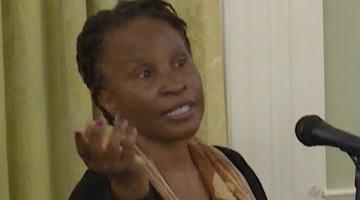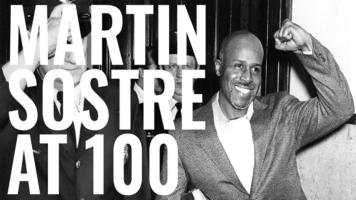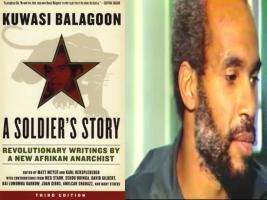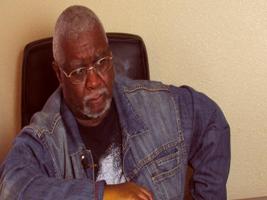In this series, we ask acclaimed authors to answer five questions about their book. This week’s featured author is Sam C. Tenorio. Tenorio is Assistant Professor in the Department of Women’s, Gender, and Sexuality Studies and the Department of African American Studies at The Pennsylvania State University. His book is Jump: Black Anarchism and Antiblack Carcerality.
Roberto Sirvent: How can your book help BAR readers understand the current political and social climate?
Sam C. Tenorio: This book’s impetus was a reading of Pip, the young Black cabin boy, in Herman Melville’s Moby Dick who jumps from a whaling boat after he is admonished through a reference to the lower profit he could bring as a slave relative to the whale. Here I saw Pip refusing a governing structure of antiblackness, revealing the processes of violence that establish and maintain ontological difference between master and slave. It is Pip’s jump that invites a disruption of the political horizons set by both Ishmael’s vision and Ahab’s monomaniacal quest, but his alleged idiocy reflects the crisis of incomprehensibility that is sustained by the foreclosure of his challenge’s referent—the racial order that his jump refuses. He led me to jumps of the enslaved during the Middle Passage which similarly cue what Barnor Hesse and Debra Thompson call the ‘anti-political logic of antiblackness,’ practices that confront the narrative obfuscations that preserve the horizons of Western liberal democratic traditions. I argue that the enslaved who jump the slave ship orient us differently to questions thought settled in the roots and routes of Black freedom struggles. The jump arouses the rethinking of spatial subversions that challenge nonrepresentationally, nonreproductively, and without resolution and are thus often thrust beyond the hem of politics proper, while also providing a new avenue for understanding the spatial order of antiblackness that hides in plain sight. Jump as a conceptual title provides us with a different view of how antiblackness lives as a spatial order and how its regulatory power endures in part through its depoliticization of abstentious, destructive, and non-assimilative subversions. In each of the book’s chapters, I trace antiblack carcerality through a different spatial refusal—a jump—that recapitulates a different facet of Black anarchism: collectivity, ruination, and maneuver.
You discuss freedom fighters like Ashanti Alston and Kuwasi Balagoon in your book. How do political prisoners inform your understanding of Black anarchism?
As much as this book does not adhere to an ideologizing of Black anarchism and its attendant problem of crystalizing what anarchism is and is not, the book would not be possible without the theorizations of those who have informed my Black anarchist framework. Ashanti Alston, Kuwasi Balagoon, Angela Davis, Lorenzo Kom’boa Ervin, George Jackson, and Assata Shakur. I know I am forgetting others, but these thinkers continue to shape how I understand Black anarchism as a refusal to labor through the reconfiguration of the current order susceptible to reproducing antiblack domination. Each has reiterated that individual acts are always tied to collective struggle and that their refusal of law-abiding avenues is a refusal to be absorbed by liberalism. They have taught me to engage the related criticism of unviability that is often leveled at Black anarchism as actually an index of disengagement with order. They have also taught me to be suspicious of political romanticization, to think of the necessary incompleteness of liberationist practice as indicative of anarchism’s agnosticism, that the terms of traditional (white) anarchism not only fail blackness but discipline it for its own white benefit, and that antiblack carcerality is foundationally concerned with the policing of Black politics. Without their work, this book does not exist.
Assata Shakur is a central figure in your analysis. Can you share how her work helped you conceptualize the Black anarchist framework of “jumping”?
As I’ve said, this book would not be possible without the intellectual work of Black radical thinkers who have rigorously theorized the relationship between carcerality and political repression. Assata Shakur is chief among them. She is integral to my work in part because she offered a way to think through the iterative nature of black anarchist practice that must persistently press against the carceral conditioning of the West. In her autobiography, Shakur illustrates how this conditioning is tied to the disciplining of her movement, how this policing of movement is foundational to the criminalization of Black people and Black political practice. In turn, her escape from prison in the United States to exile in Cuba provides a counter use of movement, what I call a dis-incarceration, that indicates both the necessity of the jump but also its precarity. While she moves beyond one carceral geography, she is unable to escape the carceral conditioning of Blackness that is indexed by the continued pursuit of U.S. state forces, which police not only her individually but Black communities collectively. The wanted billboards that go up in New Jersey and her addition to the FBI’s most wanted terrorist list function as a mapping that narrates Shakur’s place in our cultural imaginary as dangerous and criminal. I turn to the textual absence of her escape in the autobiography as a refusal of state narrations—its own kind of jumping; that is, a refusal of the state’s representative requirements of political engagement as the appropriate route to liberation. Her work invites us to ask, how does liberalism trap us into its logics of seeing and knowing, and how might opacity be necessary?
You lay out an extended critique of the work of Michel Foucault and Michelle Alexander. How do their theorizations of carceral violence fall short?
I use Foucault and Alexander to level my critique in part because each represents a dominant perspective in carceral studies. Foucault chronicles the development of the prison through the claim that punishment trends toward the covert and has supplanted gruesome spectacles of sovereign power. The work of scholars such as Angela Davis, Simone Browne, and Joy James have shown that this timeline is only possible if we excise the carceral production of Black flesh from our narration of the penal system. Even as Foucault provides important insights about the power of surveillance and self-policing, what Foucault tracks is a white prison subject that is inconsistent with the carceral violence, which is simultaneously and definitively spectacular and covert, that shapes Black life. To use Foucault to explain our carceral geographies would be to ignore the explicit links that continue to exist between chattel slavery and contemporary systems of punishment.
Alexander, unlike Foucault, is explicitly concerned with the disproportionate imprisonment of Black populations, believing today’s mass incarceration to be analogous to Jim Crow’s racial caste system. Yet, in drawing out this lineage she reduces both to an outgrowth of bad racial ideologies and improper use of state power in ways that remain committed to the legitimacy of the law and the state as protective forces of order. She is primarily concerned with reforming a failed system, of abolishing not the carceral structure but rather a particular elaboration of mass incarceration that she believes to have occurred as a result of racially discriminatory ideology. By dealing with mass incarceration as a problem separate from the structural integrity of antiblackness, she is constrained to a superficial diagnosis that is unable to account for a prison system that isn’t broken as she would have us believe and instead is flourishing in its constitutive role.
How are traditional practices (and discourses) around abolition connected to Black anarchism? What are some tensions between the two?
Conceptually, prison abolition and Black anarchism are linked through their rejection of reformist politics and their drive to dismantle institutions that embody and produce state authority. Black anarchism works from an understanding that any invocation of prison abolition is rooted in its intimate connection with the abolition of slavery. It is unmoved by Foucault’s raceless analysis and Alexander’s reformist liberalism, instead animated by the inextricability of carcerality and antiblackness. What might set it apart from traditional practices and discourses of abolition is that Black anarchism remains uncommitted to what comes next. It bucks the questions to prove its worth as we know full well that the institutions have never had to do the same. Assata Shakur’s dis-incarceration abolition proceeds without the alternative in view but works through what William C. Anderson calls destroying the gears. It is on this phase of negation that Black anarchism as I forward it in the book emerges, which means to think outside of restoration or reinvention and instead face refusal as a necessary destruction. It is based in ungovernability that questions governing as both practice and philosophy. Said another way, Black anarchism’s dis-incarceration is an abolitionist interruption of cycles of reproduction and representation that often mire Western politics and radical politics alike. Abolitionism as it is employed here refuses to retain any fealty to repair and restore as these often deny uncomfortable questions about what abolition and radicality might mean.
A key tenet of traditional anarchism is the idea of “prefiguring” the world we want. Can you please share your critique of this notion and what it would look like for revolutionary struggles to interrogate their attachment to a “prefigurative” politics?
This answer builds off my last in many ways, as my take on Black anarchism as an abolitionist practice is somewhat defined as a counter to prefiguration. Traditional Anarchism’s relationship to prefiguration is often paraphrased in the belief that revolutionary means must mirror desired ends, and while this often originates in a desire for egalitarian organizing principles, the certainty with which it proceeds to know the trajectory of means and ends has determined its engagement with Black political practices as a dismissal. It has prioritized a white Anarchist vision, with its own white imperialisms and imaginations, and has eschewed antiblack violence as irrelevant, if not invisible, to its political machinations. Prefiguration is also entangled with the matter of claim making or demands, a desire for definition and certainty that the jump refuses, offering instead another important anarchist tenet, the propaganda of the deed. To stand uncommitted to prefiguration is to stand counter to a predetermined vision often dictated by the imagination of a world fitting the needs of the state, of liberalism, and the horizons of what we know, and instead looks to practices of rupture as world-questioning. In other words, I stay with the jump because the jump loosens the hold of vision, which so often can impose limits on the inherent possibility of practice. The jump sits in this uncertain position of a question, that instead of proposing solutions that imagine closure of the ever-expanding carceral geographies in the wake of chattel slavery, it stages an interval—that which is not yet an alternative but a negation.
Roberto Sirvent is the editor of the Black Agenda Report Book Forum.



















